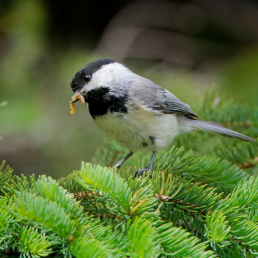

Join BirdNote tomorrow, November 30th!
Illustrator David Sibley and actor H. Jon Benjamin will face off in the bird illustration battle of the century during BirdNote's Year-end Celebration and Auction!
Pinyon Jays take their name from pinyon pines. Extracting the seeds from cones, the jays fill their throats. Then they fly to a caching site, sometimes miles away, to push each seed into the leaf litter. Collectively, they cache millions of seeds, some of which sprout before they can be eaten. Pinyon Jays are essential to the pines; the pines essential to the jays. Today, however, millions of acres of pinyon-juniper woodland have been cleared for grazing, and mature trees are dying from drought and beetle infestations.
Today’s show brought to you by The Lufkin Family Foundation.
BirdNote®
Pinyon Pines and their Gardeners, Pinyon Jays
Written by Dennis Paulson
This is BirdNote.
[Flock of Pinyon Jays calling]
Pinyon Jays are big, blue, and noisy. You’ll find them in the West, sometimes in flocks of more than a hundred birds. [Single Pinyon Jay calling]
The jays take their name from pinyon pines. These trees produce pine nuts, long valued by Native Americans and now sold in supermarkets. Large nutritious seeds, pine nuts store very well.
Extracting the seeds from cones, the jays fill their throats, then fly to traditional caching sites, sometimes miles away, to push each seed into the leaf litter. They use these cache sites year after year. And they have an uncanny ability to find their stored food. [Pinyon Jays calling]
Collectively, they cache millions of seeds, some of which sprout before they can be eaten. Thus the birds become pinyon pine gardeners. [Flock of Pinyon Jays calling]
Today, however, millions of acres of pinyon-juniper woodland have been cleared for grazing, and mature trees are dying from drought and beetle infestations. Yet by traveling long distances to find new habitat, the jays persist. [Pinyon Jays calling]
Pinyon jays are essential to the pines; the pines essential to the jays. In their mutual dependency, we find one of the many vital links in nature. [Pause]
Today’s show brought to you by The Lufkin Family Foundation. For BirdNote, I’m Michael Stein.
###
Sounds of provided by The Macaulay Library of Natural Sounds at the Cornell Lab of Ornithology, Ithaca, New York. LNS 119406 recorded by G.A. Keller.
BirdNote’s theme music was composed and played by Nancy Rumbel and John Kessler.
Producer: John Kessler
Executive Producer: Chris Peterson
© 2015 Tune In to Nature.org October 2013/2015/2019 Narrator: Michael Stein
ID# SotB-PIJA-2011-10-03



